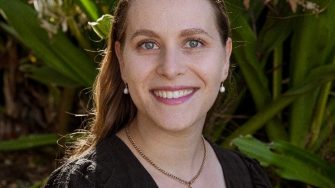
Hannah Beder
Computer Science
Technology is an increasingly pertinent part of our day to day lives. Tech literacy goes beyond being able to use tech made by others. A Computer Science degree enables people to understand how things are made, learn to build things for themselves, and think creatively about what the world needs. It puts people in the driver’s seat.
My high school was quite close to UNSW. I loved the feeling of the campus and as I spent more time there, I knew it was where I wanted to study. All my university entry preferences ended up being for UNSW Engineering degrees.
What I liked most about my CSE degree is the variety. I could go both wide and deep in the subjects I chose. As someone with very little prior exposure to computer science, it meant I could dip my toe in the water and learn what I liked and didn’t like. There was also room to do subjects outside of CSE, so I enjoyed taking courses in Music as well.
I was an academic tutor while studying. After graduating, I began my career as a software engineer, but continued to hold teaching positions. A few years in I realised that’s what I really enjoyed: teaching people coding, technology, and computer science.
In 2020 I made the leap into a new role as Creative Technologist at Creatable, an education technology company. I developed a creative technology curriculum that I then taught in girls’ high schools around Sydney. I also had the chance to create an engineering and entrepreneurship syllabus for the nation of Burundi, in partnership with UNICEF.
In my current role as Learning Design and Research Lead, my work revolves around research and development of professional learning for teachers in Australia. That said, I still can’t get enough of teaching, so I also hold positions with Code Like A Girl and OpenLearning.
The Creatable team and I work on big and complex projects with no single, simple solution. We are in a constant cycle of ideation, creation, feedback, and learning. And I continue to prepare people for the future of work, in a variety of contexts. These are all things I found myself doing at university and are relevant and transferrable in my work today.
I’ve always been an advocate for women in STEM. The general approach is ‘more women in STEM is better’. While I don’t disagree with this, the leaky pipeline isn’t fixed simply by placing more women in the system. Rather, what I have been focusing on over the past few years is increasing tech skill acquisition during the school years. This means young women can get comfortable with technology before needing to decide what they’d like to do in their careers. One day I hope that technology education will be ubiquitous and devoid of the gender stereotypes that pose a barrier for women and non-binary folks.
